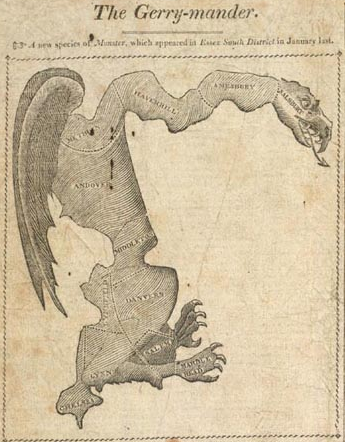Elbridge Gerry and the Original Gerrymander
Posted by Anna Khomina on Monday, 10/02/2017
Elbridge Gerry—signer of the Declaration of Independence, member of the Constitutional Convention (follow the links to documents by and about Gerry in the Gilder Lehrman Collection), congressman, diplomat, governor, and vice president—had a distinguished political career, but his legacy largely rests on one word: gerrymander.
Gerrymander refers to the act of manipulating the borders of a voting district to favor one party. This often results in serpentine, labyrinthine districts. The practice of gerrymandering has persisted with no clear rules on what constitutes acceptable versus illegal and overly partisan redistricting. This may change in October, when the US Supreme Court will hear arguments in Gill v. Whitford on the constitutionality of a redrawn district in Wisconsin. But where does the term—and the practice—originate?
In 1812, Massachusetts Democratic-Republicans drew up a plan for new voting districts to retain control of the state senate in upcoming elections. Governor Gerry, a Democratic-Republican, found the plan "disagreeable" but reluctantly signed it. The plan was mocked by the Boston Gazette, which depicted an affected district in Gerry’s home county of Essex as a salamander, calling it "The Gerry-mander." The plan, though criticized, worked as intended. In the 1812 election, the Democratic-Republicans retained control of the state senate with 29 seats to the Federalists’ 11, although the party lost control of the state house of representatives, and Gerry lost his reelection bid.
Perhaps ironically, Gerry spent most of his political career as a moderate nonpartisan, viewing the growing political divide between Federalists and Democratic-Republicans with distaste and preferring to follow his own principles rather than those of either party. He refused to sign the US Constitution in 1787 on the grounds that it had no bill of rights, and then joined with anti-Federalists to pass the Bill of Rights in Congress. However, he went on to support the economic policies of Federalist Alexander Hamilton and served as a diplomat to France under Federalist president John Adams. It was only after Federalists blamed the XYZ Affair on Gerry’s actions as a diplomat that he formally joined the Democratic-Republicans.
